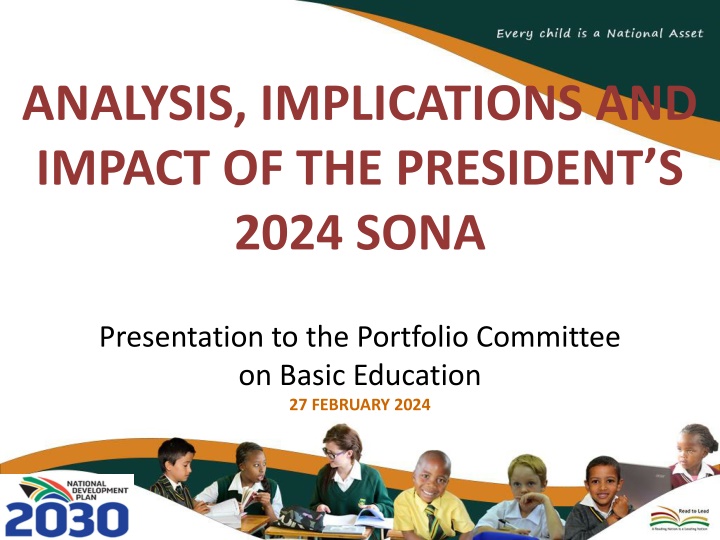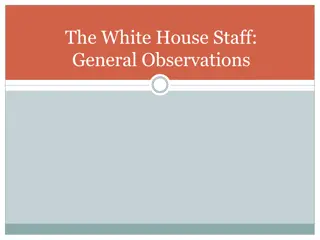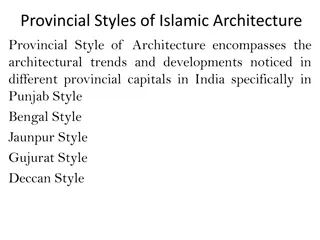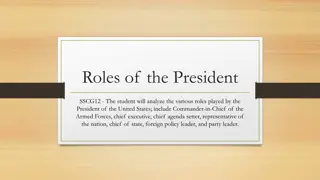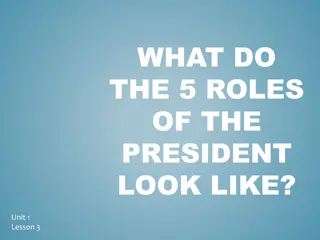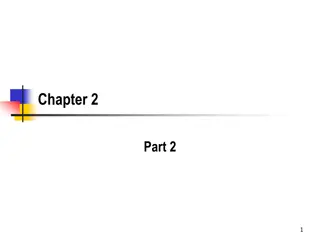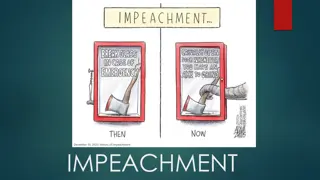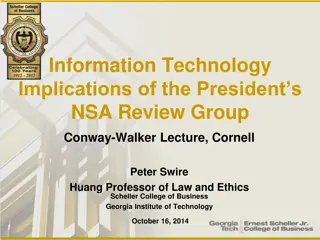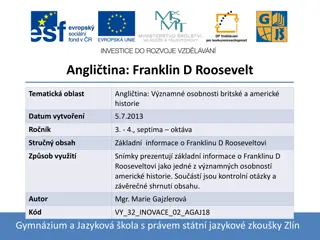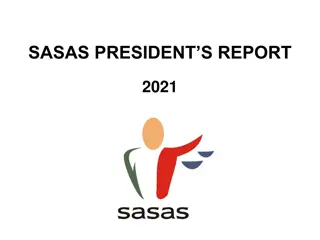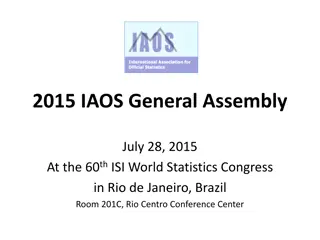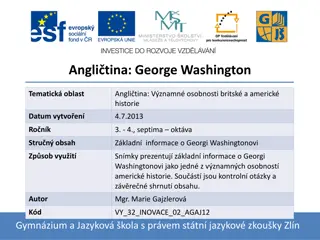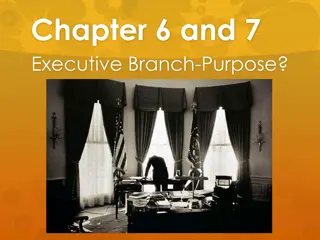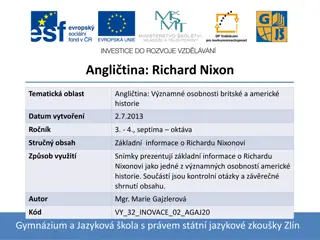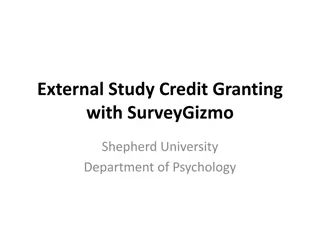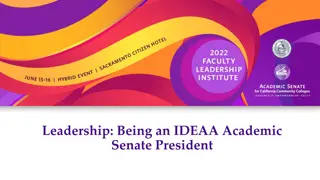ANALYSIS, IMPLICATIONS AND IMPACT OF THE PRESIDENT’S 2024 SONA
This presentation outlines the purpose, background, progress, and significance of the President's 2024 State of the Nation Address (SONA) to the Portfolio Committee on Basic Education. It includes an analysis of the SONA, comparisons with previous years, progress evaluation against past SONAs, and recommendations for the next five years. The strategic priority areas in basic education, goals/outcomes for the next 10 years, and the sector plan action plan towards the realization of Schooling 2030 are also discussed, highlighting the alignment with Sustainable Development Goals and other national plans.
Download Presentation

Please find below an Image/Link to download the presentation.
The content on the website is provided AS IS for your information and personal use only. It may not be sold, licensed, or shared on other websites without obtaining consent from the author.If you encounter any issues during the download, it is possible that the publisher has removed the file from their server.
You are allowed to download the files provided on this website for personal or commercial use, subject to the condition that they are used lawfully. All files are the property of their respective owners.
The content on the website is provided AS IS for your information and personal use only. It may not be sold, licensed, or shared on other websites without obtaining consent from the author.
E N D
Presentation Transcript
ANALYSIS, IMPLICATIONS AND IMPACT OF THE PRESIDENT S 2024 SONA Presentation to the Portfolio Committee on Basic Education 27 FEBRUARY 2024
PRESENTATION OUTLINE 1. Purpose 2. Background: Strategic Priorities 3. Progress in the sector 4. Significance of the SONA and government priorities 5. Analysis of SONA 2024 6. Comparison with Recent SONAs 7. Progress against previous SONAs 8. Looking to the next five years 9. Recommendation 2 2
PURPOSE present Implications, and Impact of the President s SONA and the Budget to Committee on Basic Education. To the Analysis, the Portfolio 3
BACKGROUND: STRATEGIC PRIORITY AREAS IN BASIC EDUCATION 4
5 GOALS/OUTCOMES FOR THE NEXT 10 YEARS MTSF 2019-2024 1) We must overcome poverty and hunger, joblessness and inequality. 2) We must overcome a legacy of exclusion and dispossession that continues to impoverish our people. 3) Our economy will grow at a much faster rate than our population. 4) Our schools will have better educational outcomes and every 10 year old will be able to read for meaning. 5) Violent crime will be halved. 5
STRATEGIC THRUST Sector plan Action Plan to 2024: Towards the realisation of Schooling 2030 (access, redress, equity, inclusivity, quality, & efficiency) 27 1 2 26 25 3 24 4 Goals 1 to 13: Improvement of Learning Outcomes 23 5 6 22 - Improve learning outcomes in Language, Mathematics and Science as measured in Grades 3, 6, 9 and 12 Ensure full access to compulsory schooling Decrease grade repetition and retention Improve access to FET colleges Improve quality of Grade R 7 21 8 20 - 9 19 - 10 18 Goals 14 to 27: Support the improvement of learning outcomes - 11 17 - 16 12 13 15 14 6
STRATEGIC DIRECTION How the sector plan relates to Sustainable Development Goals and other plans (and reports) Sector plan Action Plan to 2024: Towards the realisation of Schooling 2030 (access, redress, equity, inclusivity, quality, & efficiency) NATIONAL DEVELOPMENT PLAN (NDP) Independent analysis conducted by DBE Medium Term Strategic Framework (MTSF) DBE and PED five-year strategic plans Periodic reports on progress in the sector (see e.g., 2011 and 2013 reports on DBE website) Presidency External evaluations of key programmes; SONAs DBE and PED annual performance plans DBE and PED annual reports UNESCO 2030 AGENDA & CESA 2016-25 on the AFRICAN AGENDA 2063 PED quarterly sector reports 7 7
AU Year of Education 2024 "Educating an Africa fit for the 21st century: building resilient education systems for increased access to inclusive, qualitative, lifelong and relevant learning for Africa" 8
AU Year of Education 2024 10 targeted outcomes 1. Encourage reform of the teaching profession with comprehensive, quality development programs. Emphasize investment in STEM, foundational literacy, and numeracy, integrating technology and co-curricular activities. Enhance teachers' capacity to teach African History and support inclusion of AU's Charter on democracy in curricula. Strengthen TVET and higher education with accelerated strategy implementation. Upscale implementation of evidence-based, sustainable digital solutions. Create healthy, conducive learning environments through Home-Grown School Feeding, Peace and Health Education. Enhance equitable access to quality education for underrepresented groups, especially in emergencies and conflict areas. Improve synergies between education management systems and labor market data. Establish and strengthen multi-sectoral and multi-stakeholder partnerships for education. Increase sustainable financing and systematic investment in Education. 2. 3. 4. 5. 6. 7. 8. 9. 10. 9
AU Year of Education 2024 3 key concerns raised Although the out of school rate,i.e., the proportion of children and young people in the official age range for the given level of education, who are not enrolled in pre-primary, primary, secondary or higher levels of education keeps decreasing steadily, especially for the primary level, the absolute number has reached the alarming global estimate of 98 million in Africa. The learning poverty rate, i.e., the share of children, who cannot read a simple text with comprehension by age 10 was the highest in sub-Saharan Africa before COVID-19 pandemic at 86%. This rate is likely to have worsened after the pandemic, estimated now at 90%. This means that nine out of ten children cannot read a simple text with comprehension by age 10. Africa will need 17 million additional teachers in order to achieve universal primary and secondary education by 2030. 1. 2. 3. 10
PROGRESS IN THE SCHOOLING SYSTEM Over the course of thirty years, the basic education sector in South Africa has made significant progress towards transformation along six internationally acknowledged dimensions: access, redress, equity, quality, efficiency and inclusivity. 12
PROGRESS IN THE SCHOOLING SYSTEM Access There is now near- universal access to schooling measured by the attendance rate amongst learners of the compulsory school-going age (7 to 15-year-olds) this has been above 98% ever since about 2009. 13
PROGRESS IN THE SCHOOLING SYSTEM Proportion of 5- and 6-year-olds accessing Education Institutions 100 Access 90 Percentage of children 80 70 In 2002, fewer than 40% of 5-year-olds were enrolled in educational institutions, a figure that has now surged to nearly 90% in recent years. 60 50 40 30 20 10 0 2004 2015 2002 2003 2005 2006 2007 2008 2009 2010 2011 2012 2013 2014 2016 2017 2018 2019 2020 2021 2022 5 6 Source: General Household Surveys 14
PROGRESS IN THE SCHOOLING SYSTEM Grade Completion Rates in South Africa 85 87 88 89 89 90 90 91 92 93 93 94 95 95 94 95 95 95 95.896.696.6 77 79 80 80 81 82 83 86 85 86 85 87 87 89 90 90 91 93.594.292.2 100 Attainment 90 80 70 South Africa has also been one of the fastest-improving countries in international standardized assessments, including TIMSS, PIRLS, and SEACMEQ. 59.861.360.5 73 40 41 42 40 42 42 43 45 46 47 47 48 51 50 50 51 54 55 60 50 40 30 20 10 - 2010 2011 2002 2003 2004 2005 2006 2007 2008 2009 2012 2013 2014 2015 2016 2017 2018 2019 2020 2021 2022 Grade 7 Grade 9 Grade 12 15
PROGRESS IN THE SCHOOLING SYSTEM Attainment 16
PROGRESS IN THE SCHOOLING SYSTEM Quality McKinsey, 2024 17
PROGRESS IN THE SCHOOLING SYSTEM Quality The number of NSC candidates obtaining a bachelor pass has nearly tripled since 2008, with the strongest growth coming from non- fee-paying schools, demonstrating the equitable nature of these improvements. NSC results since 2020: 2020: 76.2% ; 2021: 76.4%; 2022: 80.1%; 2023: 82.9% 18
PROGRESS IN THE SCHOOLING SYSTEM Efficiency In part, better NSC results were caused by improved efficiency in the system: lower grade repetition rates meant less over-age learners in grades 10 and 11 and allowed more youths to reach grade 12 and get an opportunity to write their NSC examinations Source: Gutaffson (2024) Sector Review 19
PROGRESS IN THE SCHOOLING SYSTEM Redress Expanded access has mainly benefited historically disadvantaged population groups, thus contributing to redress for past injustices: For instance, a mere 10% of Black South Africans born in the 1950s and 1960s completed 12 years of education. By contrast, those born in the 1980s, who completed their schooling in the late 1990s, saw this figure rise to approximately 30%. According to 2021 household survey data, nearly 60% now attain this milestone 20
PROGRESS IN THE SCHOOLING SYSTEM Equity and Inclusivity Some improvements in the system have been attributable to highly intentional pro-poor education policies: Government provides a nutritious meal every school day to about 9.6 million children (about 84% of all learners), while 75% of public- school learners do not pay school fees. These policies help alleviate the financial burden on vulnerable households and create meaningful opportunities to attend and progress through school. Policies to screen and identify children for special educational needs have also helped ensure that more than 90% of 7-15-year-old children with disabilities now attend school. 21
SIGNIFICANCE OF SONA Presidential pronouncements contribute to setting the key government priorities and deliverables: In turn, determine the priorities of the DBE and the basic education sector broadly. The pronouncements commit the DBE, in public, to key activities and outcomes. It is important to ensure and show alignment to current annual plans for the DBE and for the sector. 22
SONA 2024 Over the last three decades, we have been on a journey, striving together to achieve a new society a national democratic society. 23
SONA 2024 Early Childhood Development Over the next five years, we will focus our attention on expanding access to early childhood development and improving early grade reading, where we are already beginning to see progress. Moving early childhood development to the Department of Basic Education was one of the most important decisions as we were now able to devote more resources to early childhood development and ensure that through cooperative governance various departments of government get involved in early childhood development augmented by the Department of Basic education. 24
SONA 2024 National School Nutrition Programme Tintswalo was enrolled in a school in which her parents did not have to pay school fees, and each school day she received a nutritious meal as part of a programme that today supports 9 million learners from poor families. Presidential Employment Stimulus (Education) Through the stimulus, we have placed more than 1 million school assistants in 23,000 schools, providing participants with valuable work experience while improving learning outcomes. 25
SONA 2024 Matric Results Our basic education outcomes are steadily improving across a range of measures. The latest matric pass rate, at 82.9%, is the highest ever. And with each new year, learners from no-fee schools are accounting for more and more of the bachelor passes achieved. At the same time, fewer learners are dropping out of school. 26
COMPARISON TO RECENT SONAs 12
COMPARISON OF PREVIOUS SONA Focus areas Feb 2020 Feb 2021 Early Learning: Reading & Numeracy Early Learning: Reading & Numeracy Lessen Covid-19 related school disruptions Migration of ECD Improving educational outcomes Fourth Industrial Revolution and ICTS/Operation Phakisa Focus on ECD planning and funding Competencies and Skills for a Changing World Coding & Robotics Improving school readiness and safety LSEN Support: SASL as HL 27
COMPARISON OF PREVIOUS SONA Focus areas Feb 2021 Feb 2022 Early Learning: Reading & Numeracy Special Purpose Vehicle to deliver school infrastructure Lessen Covid-19 related school disruptions Improving educational outcomes Focus on ECD planning and funding Learning Recovery Teacher Assistants Improving school readiness and safety 28
COMPARISON OF PREVIOUS SONA Focus areas Feb 2022 Feb 2023 Special Purpose Vehicle to deliver school infrastructure Focus on ECD support and expansion Special Purpose Vehicles to deliver school infrastructure, SAFE & ASIDI Learning Recovery Focus on expansion of vocational training Teacher Assistants Matric Results 29
COMPARISON OF PREVIOUS SONA Focus areas Feb 2023 Feb 2024 Presidential Employment Stimulus (Education) Focus on ECD support and expansion National School Nutrition Programme (NSNP) Special Purpose Vehicles to deliver school infrastructure, SAFE & ASIDI Focus on expansion of vocational training Matric Results Matric Results 30
PROGRESS AGAINST PREVIOUS SONAs 14
THE VISIONFOR ECD WITH DBE The five strategies for improving the quality of ECD in South Africa: 1. Curriculum-based early learning for all children birth to 5 years implementing the National Curriculum Framework. 2. Access to early childhood development programmes for all children birth to 5 years a continuum of programmes. 3.Training and development for all those working in ECD career paths, with intensive but flexible training opportunities. 4. Co-ordination of all early childhood development services. 5. A flexible funding and provisioning framework. 33
EARLY CHILDHOOD DEVELOPMENT SONA COMMITMENTS PROGRESS REPORT A new business proposal requesting funding for an Employment Initiative for ECD has been submitted to National Treasury to secure or create 85,000 jobs. Plans are being prepared to work with the Social Employment Fund should Presidency be successful in their PEYI bid. CHALLENGES Funding not yet confirmed 2020 COMMITMENTS Government will also ensure that young people are employed in social economy jobs such as ECD & health care. 34 34
EARLY CHILDHOOD DEVELOPMENT SONA COMMITMENTS PROGRESS REPORT CHALLENGES ECD funding: Training and change management on implementing the guidelines is ongoing. All provinces are supported on implementing the new application process. 2022 COMMITMENTS Improving school readiness, ECD planning and funding, protection against preventable diseases, policy reform around child welfare and reducing violence against children. None ECD subsidy Engaging local donors to contribute to the results-based financing initiative to support a public-private partnership approach to ECD delivery. Workshop held with donors. Final design of payment metrics. 35 35
EARLY CHILDHOOD DEVELOPMENT SONA COMMITMENTS PROGRESS REPORT CHALLENGES Improving ECD planning: New service delivery model for ECD developed. A 6 year strategy and implementation developed. Currently working on the development of the Social Compact to enable the implementation of the SDM. The results-based financing initiative will be phase 1 of the implementation of the Social Compact. None 2022 COMMITMENTS Improving school readiness, ECD planning and funding, protection against preventable diseases, policy reform around child welfare and reducing violence against children. plan has been 36 36
EARLY CHILDHOOD DEVELOPMENT SONA COMMITMENTS PROGRESS REPORT CHALLENGES Improving ECD planning: Change started to train and support district and provincial officials on system use and using data to inform their planning. Busy wit the procurement process to contract a Service Provider to develop the eCares system to improve planning, monitoring and reporting. Usage of digital tools by provinces require substantial change management and improvement of ICT in some district and circuit offices. 2022 COMMITMENTS Improving school readiness, ECD planning and funding, protection against preventable diseases, policy reform around child welfare and reducing violence against children. management process has 37 37
EARLY CHILDHOOD DEVELOPMENT SONA COMMITMENTS PROGRESS REPORT CHALLENGES Progress: At 30 September 2023, 882,128 children received the subsidy. We estimate that 1,284,725 children currently in ECD programmes should be receiving the subsidy, leaving an access gap of 551,966 children. North West is underspending, but has shown real improvement over the last two months. 2023 COMMITMENTS Progress updates on number of children receiving ECD subsidy Monitoring and support: Five provinces have been monitored and supported on the delivery of the ECD: NC, NW, MP, WC and KZN. 38 38
EARLY CHILDHOOD DEVELOPMENT SONA COMMITMENTS PROGRESS REPORT CHALLENGES Progress: Partnered with the DoH, COGTA and SALGA to streamline the registration requirements. engineering in 4 municipalities have started to guide the work. Have engage municipal managers on the role that they need to play in adopting a more developmental approach to ECD. Complexity of working with municipalities 2023 COMMITMENTS Progress on streamlining requirements for ECD centres to access support and enable thousands more to receive subsidies from government Business process 39 39
READING PROGRESS REPORT SONA COMMITMENTS CHALLENGES EARLY GRADE READING PROGRAMME (EGRP): Impact to date Increased HL ORF and Comprehension by 40% of a year of learning at the end of Grade 2; Better EFAL written comprehension in Grade 7 (4 years after intervention ended) this reflects the benefits of learning to read in Home Language for later language transfer; Lower grade repetition: Children were 15% more likely to reach grade 7 without repeating a grade. Coordination and funding 2019/2020 COMMITMENTS We are implementing the Early Grade Reading Programme, consists integrated package of lesson plans, additional reading materials & professional support to Foundation teachers. Continued research to identify cost-effective teacher support models (DHs, SA s, virtual coaching) which of an Phase DHs struggle with time to observe lessons and conduct coaching; (EAs can help supervise DH classrooms) EGRP: Implementation in Dr RSM in 140 schools from 2021-2023 is ongoing. Term 4 implementation is taking place. EGRP II: Northern Cape scale-up engagement for Setswana & EFAL mono & multigrade in 2024-2025 funded by Gates Foundation and UNICEF. Finalise appointment of Service Provider (UNICEF) 40
READING PROGRESS REPORT SONA COMMITMENTS CHALLENGES African Languages Reading Benchmarks: 2019/2020 COMMITMENTS We are implementing the Early Grade Programme, which consists of an integrated package of lesson plans, reading materials professional Foundation Phase teachers. No significant challenges have been identified Tshivenda: Consolidated, adopted and publicly launched. Reading Xitsonga Consolidated, adopted and publicly launched. additional EGRA: Updating of EGRA tools with benchmarks & to support A tool to measure impact on reading outcomes: Funda Uphumelele: Forms part of Reading Literacy Strategy M&E Plan
INCLUSIVE EDUCATION PROGRESS REPORT SONA COMMITMENTS CHALLENGES Insufficient spaces in special schools-led to waiting lists in PEDs such GP. Slow pace on the placement of learners from special care centres to schools Backlogs in the assessment of the intellectual functioning of learners for appropriate support. Vacancies education personnel district level 1. Mobilisation of out-of-school children/learners of school-going age: 2019/2020 COMMITMENTS We need to provide skills & create opportunities for persons with disabilities. It is therefore a matter of great concern that there are around half a million children of school-going age with disabilities who are not in school. Established6 a national task team is prioritising learners with no disabilities and those with Mild-Moderate, physical or severe intellectual disability. The number of out-of-school children with disabilities in special care centres for 2019-2023 economic of inclusive at 42
INCLUSIVE EDUCATION PROGRESS REPORT SONA COMMITMENTS CHALLENGES Insufficient spaces in special schools-led to waiting lists in PEDs such GP. Slow pace on the placement of learners from centres to schools Backlogs in the assessment of the intellectual functioning of learners for appropriate support. Vacancies of inclusive education personnel at district level 1. Mobilisation of out-of-school children/learners of school-going age: Categories of disabilities identified in the SCCs for 2023 - Q2 2019/2020 COMMITMENTS We need to provide skills & create opportunities for persons with disabilities. It is therefore a matter of great concern that there are around half a million children of school-going age with disabilities who are not in school. economic special care The placement of learners not in SCCs are fast-tracked and the admission of learners in to special school via the district office as both DBE and PEDs work very closely to ensure that learners are placed. 43
INCLUSIVE EDUCATION PROGRESS REPORT SONA COMMITMENTS CHALLENGES Vacancies at district level in some PEDs: therapeutic mechanisms at that level. Training is not always targeted to areas intervention; Inadequate focus on training of teachers in ordinary schools too much focus on special schools; Inadequate teachers to enroll in courses on disability. 2. qualifications in specialised areas of inclusion( in-service teachers): teachers were trained on SASL, Autism, braille, psycho-social other areas. The training of officials is also being tracked to ensure that learners and teachers are supported. Improvement of teacher competencies and 2019/2020 COMMITMENTS We need to provide skills & create opportunities for persons with disabilities. It is therefore a matter of great concern that there are around half a million children of school-going age with disabilities who are not in school. Inadequate support economic that require YEAR YEAR NUMBER OF TEACHERS TRAINED NUMBER OF TEACHERS TRAINED 2017 2018 2 188 18 175 2019 2020 2021 2022 49 508 3 464 16 920 incentives for 68 689 Total 158 944 Training of teachers includes the : identification of barriers to pre-literacy skills in pre- scholars, Identification of barriers to reading and numeracy skills of learner in foundations phase and; Strategies for addressing reading and numeracy barriers in the foundation phase- implementation of the early screening and support of learners). This is implemented all nine(9) PEDs. Therapists together with learner Support Educators (LSEs) are driving this process 44
INCLUSIVE EDUCATION PROGRESS REPORT SONA COMMITMENTS CHALLENGES 2. The collaborative partnership between Department of Basic Education and Department of Higher Education and Training has led to the development of specialised university qualifications in education of learners who are/have: No significant challenges have been identified 2019/2020 COMMITMENTS We need to provide skills & create opportunities for persons with disabilities. It is therefore a matter of great concern that there are around half a million children of school-going age with disabilities who are not in school. economic 45
THREE STREAM MODEL PROGRESS REPORT a) LTSM: Further development and completion of required LTSM for the Three Stream Model (TSM) is on hold pending the acquisition of additional funds for the task. The Department has quality assured Civil, Electrical and Mechanical Technology Teacher and Learner guides for access by learners and teachers. Draft copies of the Occupational and Vocational Oriented subjects are available on the DBE website. SONA COMMITMENTS CHALLENGES a) Delayed completion of LTSM might adversely impact on the rolling out of the Vocational Stream subjects at Grades 8 & 9 in 2024. - EU restricted funding 2019 COMMITMENTS Several new technology subjects and specialisations will be introduced. To expand participation in the technical streams, several ordinary public schools will be transformed into technical high schools. a) Teacher Training: Training of teachers and subject advisors in the practical skills components of Vocational and Occupational subjects in the TSM is still on hold. a) The NT has been requested to permit the DBE to carry out a virement on the E4E donor funds to accommodate the additional funding required development training. b) The AGGP_SA is proposing 14 entrepreneurial that would need to align with those on the DBE draft SA Competencies Framework. 2020 COMMITMENTS We are making progress with the introduction of the three- stream curriculum model, heralding a fundamental shift in focus towards more vocational and technical education. Various technical vocational specialisations have already been introduced in 550 schools and 67 schools are now piloting the occupational stream. for LTSM teacher and b) Entrepreneurship Initiatives: The DBE is working on the establishment of a partnership with the Allan & Gill Gray Philanthropies SA (AGGPSA) on Entrepreneurship Education in South African Schools. competencies c) The Three Stream Think Tank Process: In preparing for the introducing of the Occupational Stream in the FET Phase, new subjects are to be developed. This has necessitated the undertaking of a Rapid Formative Descriptive Evaluation in identified schools. c) The uptake of the workstreams established from the initial Think Tank engagement has not been satisfactory. 46
SKILLS FOR A CHANGING WORLD SONA PROGRESS CHALLENGES COMMITMENTS Provinces have Identified a total of 1770 Schools to Pilot Coding and Robotics: 200 Schools are piloting in Foundation Phase and Intermediate Phase A further 1000 Schools pilot in grade 7 and 570 Schools are piloting in grades 8-9 Timetabling is a huge factor. 2019 COMMITMENTS In line with our Framework for Skills for a Changing World, we are expanding the training of both educators and learners to respond to emerging technologies including the internet of things, robotics and artificial intelligence. It is why we are emphasising the teaching of science, technology, engineering & maths in schools, why we are introducing subjects like coding & data analytics. Improve the education system and develop the skills that we need now and into the future. Other challenges are connectivity in schools as well as lack of sufficient coding and robotics resources. APP 2.1.13: This is an Annual APP. The DBE has monitored 12 of the 18 schools in fulfilment of APP target for 2023/2024 Financial Year. Report submitted and evidence uploaded on S-Drive. The DBE has initiated quarterly interprovincial meetings with provincial Project managers to enable sharing of good practices.- PARTNERSHIPS AND COLLABORATION EVENTS: The AGCCI The African Girls Can Code Initiative is a partnership between United Nations Women, The Department of Science and Innovation (DSI) and the DBE. The DBE and its partners have completed 2 Boot Camps in 2023 90 Grade 11 Girls were impacted 20 Teachers were impacted 90 Laptops were given to the girls to complete an online mentorship program with SIEMENS The laptops becomes property of the schools after the mentorship program The WC learners participated in the International Celebration of the Girl Child in collaboration with UN Women on 26 October 2023 in Paarl, WC Coding and Robotics is an unfunded mandate, therefore, insufficient/lack of funding for coding and robotics implementation in schools; Lack of Subject Advisors to Coordinate the Activities of Coding & Robotics in PEDs; No Budget to Procure Resources; (MST CG does not cover all resources needed) Technical Support Needed to Assist Teachers; 2020 COMMTMENTS This year, we will be introducing Coding and Robotics in Grades R to 3 in 200 schools, with a plan to implement it fully by 2022. SITA ROBOTICS Challenge Gov Tech Conference was held in Durban at the International Convention Centre. In September 2023 The 20 Schools that participated in the challenge all received coding and robotics resources to build robots MOU between the DBE-SITA is reaching finality, documents with Legal for purposes of formalising the collaboration Theft of ICT Devices; 47
SCHOOLS CONNECTIVITY The table below indicates the cumulative number of schools provided with connectivity since 2019 based on the DBE driven project (Social Obligations and SA Connect). Province Province Total no schools BASELINE 2019/20 Baseline 2020/21 USAO 2021 Baseline 2022/23 USAO 2022/23 Baseline 2023/24 5 154 3 828 4 036 16 4 052 0 4 052 Eastern Cape 1 013 1 389 1 501 7 1 508 0 1 508 Free State 2 210 2 289 2 344 17 2 361 29 2 390 Gauteng 5 876 2 734 2 870 24 2 894 17 2 911 KwaZulu Natal 3 710 1 665 1 735 20 1 755 0 1 755 Limpopo 1 672 1 219 1 291 6 1 297 0 1 297 Mpumalanga 556 1 027 1072 1 1073 0 1 073 Northern Cape 1 482 1 309 1 437 21 1 458 4 1 462 North West 1 522 2 054 2 098 23 2 121 0 2 121 Western Cape 17 514 18 384 135 18 519 50 23 195 18 569 Total Percentage Percentage 70,69% 70,69% 74,2% 74,2% 79,8% 79,8% 80,1% 80,1% 48
TEACHER EFFICIENCY PROGRESS REPORT SONA COMMITMENTS CHALLENGES NTA Ceremony held on 5 October 2023 on World Teachers Day. 38 winners were awarded. The event was held at the Hearfelt Arena in Pretoria where 500 guests were invited. Verification visits were conducted for 10 winners to confirm their input presented. The internal audit report was finalised at a meeting on 26/10/23 and presented with recommendations to strengthen the process. Reflection meetings were held with the DG and with the TASP Steering Committee on 02/11/23 to reflect on the processes gains and mitigation of challenges. A meeting of the chairpersons of the adjudication panels met virtually on 07/011/23 to present their reports which included their observations, challenges and recommendations to strengthen the process going forward. Ms Vicky Mpompolas 2022 NTA Secondary School winner from (NC) won the of AU (Southern African region) Prize - 10 000 dollars and was invited to attend the ceremony on the 5th October 2023 as the Minister s guest. Dr Wheeler from WC (2021 National Best Teacher winner) and Mr E Masweneng 2021 winner of Technology Enhanced Learning and Teaching Award) from LP was selected as one of the top 50 in the Global Teachers prize (UNESCO). Dr Wheeler was placed in the to 10. Both candidates attended the ceremony in Paris on 08/11/23. Ms Celestine Stuurman the 2022 SHERO FET winner from McLachlan High School in the Eastern Cape is currently in China attending the Belt & Road Teacher Professional Development Project 2023. Logistical issues during event Additional expenses for event Cost containment 2019/2020 COMMITMENTS We must pay tribute to the teachers and do everything within our means to value, equip and empower them 49
SOCIAL COHESION PROGRESS REPORT SONA COMMITMENTS CHALLENGES GENDER RESPONSIVE PEDAGOGY TOOLKIT FOR EARLY CHILDHOOD EDUCATION (GRP4ECE) No significant challenges have been identified 2019/2020 COMMITMENTS Focus on the first 1 000 days in every child s life through investment in health care, socialisation, good nutrition, social grants, childcare, a clean and safe environment and structured early learning. GRP4ECE implemented to support the inclusive social construction of gender in the socialisation of children in early childhood education (through to the end of the Foundation Phase), delivered through ECD centres and Primary schools. Development of agreement with the ETDP SETA finalised and submitted to ETDP SETA for the next phase that would be rolled out in the remainder of the provinces, namely: Gauteng, Western Cape, Mpumalanga and Limpopo. adequate positive quality 50
